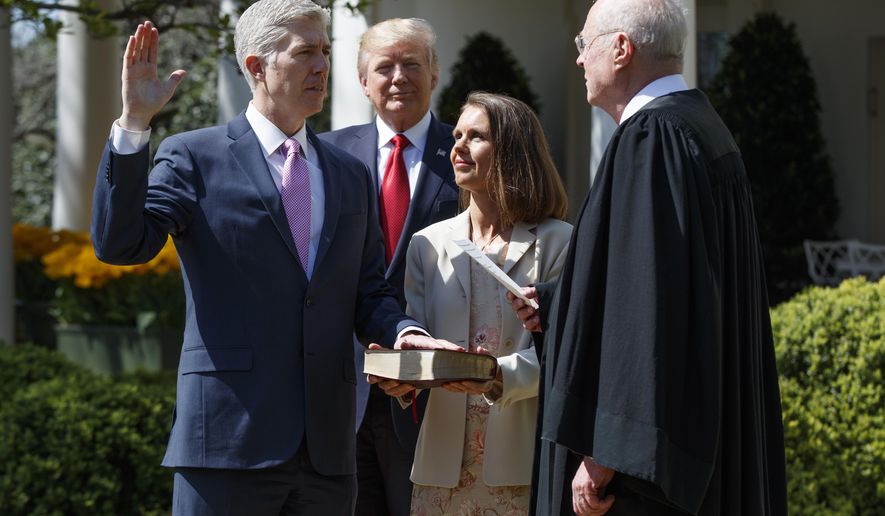OPINION:
The fireworks over the elevation of Neil Gorsuch to the U.S. Supreme Court — he was sworn in Monday as the ninth justice — overshadowed a perversion of the law by the 7th U.S. Circuit Court of Appeals in Chicago that could offer an early indication of the tilt of the newly restored Supreme Court.
Kimberly Hively was a professor at Ivy Tech Community College in South Bend, Ind., who was passed over for a promotion. She said it was because she is a lesbian and she sued the college for violating the Civil Rights Act of 1964. Neither the text of the act, nor anything in its legislative history, addresses such discrimination, but her lawyers argue that it should be interpreted as if it did.
The suit was dismissed by lower court judges, but the judges of the 7th Circuit in an 8 to 3 decision discovered heretofore unknown provisions of the Civil Rights Act that protect gay, lesbian and bisexual persons from discrimination in the workplace.
Writing for the majority, Chief Judge Diane Wood (appointed by President Clinton) held that “the fact that the enacting Congress may not have anticipated a particular application of the law cannot stand in the way of the provisions of the law that are on the books.”
Judge Wood was joined by five judges appointed by Republican presidents, who should been expected to know the law better. One of them, Judge Richard Posner (appointed by President Reagan) wrote that changing societal norms called for a new interpretation of the Civil Rights Act, and he would offer such a rewrite. “It is well-nigh certain that homosexuality did not figure in the minds of the legislators who enacted Title VII.” Such primitives, he said, “shouldn’t be blamed for that failure of foresight. We understand the words of Title VII differently, not because we’re smarter than the statute’s framers and ratifiers, but because we live in a different era, a different culture.”
In a withering dissent, Justice Diane Sykes (appointed by President George W. Bush), called out her colleagues for legislating from the bench. “We are not authorized to infuse the text with a new or unconventional meaning or to update it to respond to changed social, economic or political conditions.
“The Constitution assigns the power to make and amend statutory law to the elected representatives of the people,” she reminded her colleagues. Their ruling “comes at a great cost to representative self-government.”
The 7th Circuit’s ruling will inevitably reach the Supreme Court because it conflicts with the ruling in a similar case by a three-judge panel of the 11th Circuit Court in Atlanta that found that sexual orientation is not a protected class under Title VII.
This dispute illustrates why Senate Democrats were so fierce in opposition to the confirmation of Neil Gorsuch. No one knows how he might rule in this case, or one like it, but his record suggests that he will be a threat to the left’s wishes and dreams for “results-oriented” jurisprudence, not fidelity to the rule of law.
If judges want to legislate, as it appears that some do, they can resign their lifetime commissions and run for a seat in Congress, a state legislature, or even a city council, and legislate away. The law “is a ass,” as Charles Dickens observed, but a judge doesn’t have to be one.




Please read our comment policy before commenting.